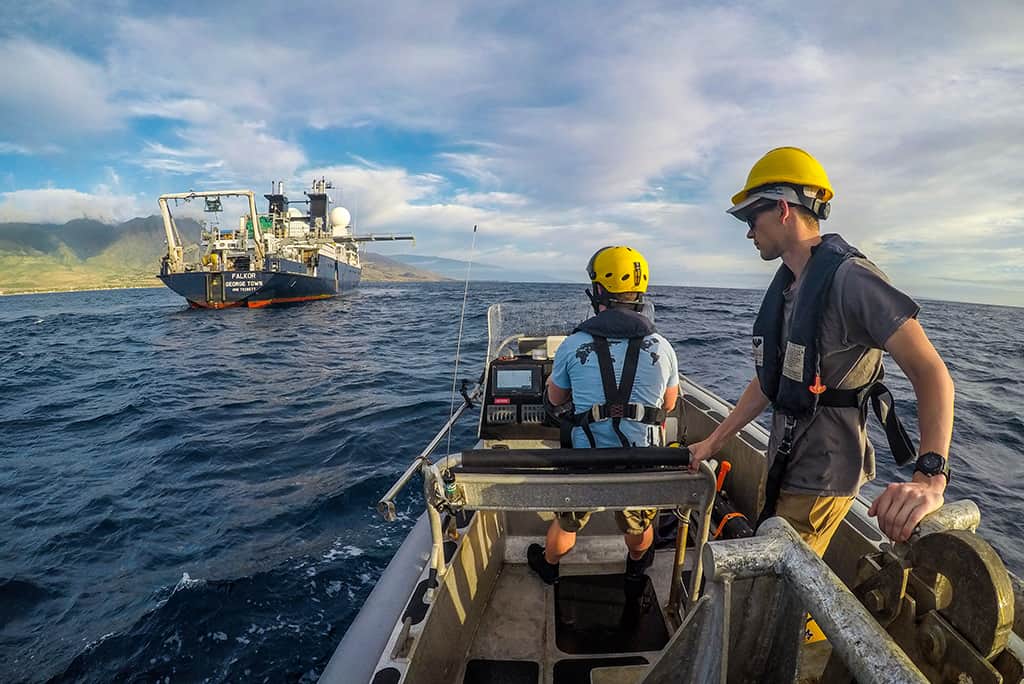Undergraduate Projects
Summer Research Opportunities

The Summer Undergraduate Research in Engineering (SURE) and Summer Research Opportunity Program (SROP) gives undergraduates a chance to participate in summer research in their field. Students who’ve begun or completed their third year can apply to the program.
NA&ME Project #1: Floating Offshore Wind Energy in the Great Lakes Region
Faculty Mentor: Lei Zuo, [email protected]
Prerequisites: Completion of courses relative to one or more of the following: Marine Hydrodynamics, Marine Structures, Fluid Dynamics, Aerodynamics, or similar courses.
Desired Skills/Experience: Familiarity with MATLAB is required and with OrcaFlex is helpful but not required.
Project Description: The Great Lakes area offers an enormous offshore wind capacity of 743 gigawatts (GW), surpassing that of the New England or Middle Atlantic region. Despite this significant potential, the development of offshore wind energy has been slow in the region. This project seeks motivated students to assist in developing new research projects related to offshore wind energy in the Great Lakes region. The student research involves evaluating and providing solutions to the technical challenges associated with future offshore wind projects in the Great Lakes.
The technical challenges include addressing hydrodynamics, and the structural response of the floating offshore platform under wave, wind, current, and ice loadings. The behavior and response of the platform under these loads can be evaluated using advanced numerical tools such as OrcaFlex.
The preliminary findings of the SURE student during this project will be used to apply for new grants, which can potentially support the student during their graduate studies.
Research Mode: In Lab
NA&ME Project #2: Dual-Functional Tuned Inerter Damper for Enhanced Semi-Sub Offshore Wind Turbine
Faculty Mentor: Lei Zuo, [email protected]
Prerequisites: Completion of ME 240 Dynamics or NAME 340 Marine Dynamics is required.
Desired Skills/Experience: Familiarity with MATLAB is required and with OpenFAST is helpful but not required.
Project Description: As the world increasingly turns to renewable energy, offshore wind emerges as a promising resource, especially in deeper waters where floating turbines can capture stronger wind profiles. Unlike fixed-bottom turbines confined to shallow depths, floating turbines offer a broader range of deployment but face
challenges with increased motion and ultimate loads.
Our team is addressing this challenge by developing a dual-functional tuned-inerter damper (TID) specifically designed for semi-submersible offshore wind platforms. This retrofittable device aims to not only enhance the stability of these floating structures but also to harvest energy from both wind and wave-induced vibrations. This is an opportunity to work alongside Dr. Lei Zuo and his research group, and gain experiences with numerical tools such as OpenFAST.
Research Mode: In Lab
NA&ME Project #3: Adaptive Hybrid Noise Mitigation for Offshore Wind Turbine Construction using Metamaterials
Faculty Mentor: Lei Zuo, [email protected]
Prerequisites: Completion of ME 240 Dynamics or NAME 340 Marine Dynamics is required, and other courses related to vibration and/or acoustics are preferred.
Desired Skills/Experience: Familiarity with MATLAB is required and with OpenFAST is helpful but not required.
Project Description: As offshore wind energy expands rapidly, the noise pollution from pile driving during turbine construction poses significant risks to marine ecosystems, especially affecting marine mammals like whales. Current noise abatement solutions struggle to address low-frequency noise and adapt to diverse underwater environments.
Our team is developing an innovative hybrid noise mitigation system using acoustic metamaterials for offshore wind turbine construction. This system combines inflatable balloon curtain to attenuate waterborne noise paths with an array of metamaterial mini-piles in the seabed to suppress soil borne noise paths. The goal is to create an adaptive system that can effectively reduce noise across a broad frequency range, particularly below 500 Hz, while adjusting to various pile conditions and marine habitats.
This project offers an opportunity to work on acoustic metamaterial applications. Students will gain experience with modeling and simulation tools, participate in scaled laboratory experiments, and potentially contribute to open-water testing plans.
Research Mode: In Lab
NA&ME Project #4: Build and Test of a Portable Hybrid Wave & Current Energy Converter Prototype
Faculty Mentor: Lei Zuo, [email protected]
Prerequisites: Completion of courses related to one or more of the following: Fluid Dynamics, Marine Hydrodynamics, Marine Structures, Manufacturing Techniques
Desired Skills/Experience:
-Experience in machine shops is helpful but not required
-Familiar with mechanical design using Solidworks or other CAD software
-Basic understanding of marine renewable energy
-Hand-on experience with mechanical systems/knowledge on numerical
simulation using MATLAB is a plus
Project Description: The Marine Renewable Innovations and Education Lab is developing a lab-scale prototype of a portable hybrid wave and current energy converter. This device has the unique design that can harvest ocean wave
energy and the ocean current energy at the same time. We are looking for undergraduate students who are interested in conducting mechanical design and hardware implementation and testing of the device. The job includes improving the current design with better efficiency and reliability, applying hardware building and
assembling, and conducting some dry-lab and wave tank tests. Thus, students with strong hands-on experience and problem-solving skills are encouraged to apply. The job is expected to be done in multiple locations, including the NAME building at the North Campus and the MHL building at Central Campus. In-person attendance required.
Research Mode: In Lab